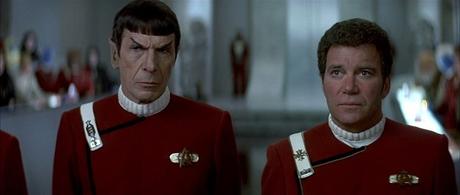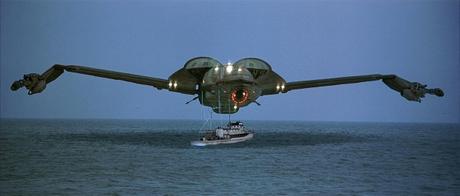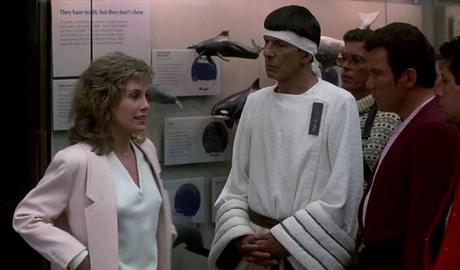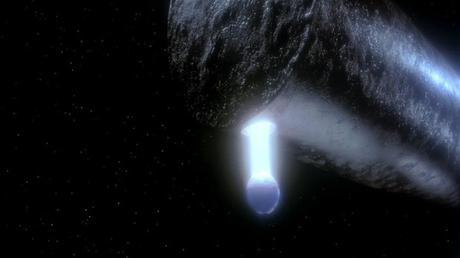The Star Trek Re-Watch - Star Trek IV: The Voyage Home

One of the positive consequences of the COVID-19 pandemic, has been the ability for people to explore television shows and films they never got around to see. This of course comes with the caveat that one actually has time to do so. Depending on certain circumstances (i.e. children or lack thereof and the essential nature of your job) this may or may not be the case. Nevertheless, millions of people who didn't have free time before now have the opportunity to watch every episode of The Wire or the entire Harry Potter series.
With that in mind I thought it was high time to explore some gaps in my film and television lexicon. So of course I completely scrapped that idea and decided to re-watch every one of the thirteen Star Trek films that have been released since 1979. We continue on our journey down the warp lane with easily the most environmentally conscious film of the series, Star Trek IV: The Voyage Home.
Star Trek IV: The Voyage Home (1986) Director: Leonard Nimoy Written By: Harve Bennett Starring: William Shatner, Leonard Nimoy, DeForest Kelley, James Doohan, George Takei, Walter Koenig, Nichelle Nichols, Catherine Hicks.
Plot: After spending three months as outcasts on Vulcan, James T. Kirk and the remaining crew of the Enterprise decide to return to Earth to face their fate. At the same time a probe of unknown origin is moving through the sector headed directly towards Earth. All attempts to communicate with the probe fail and it subsequently wreaks havoc on the planet. Spock discovers that the probe is trying to communicate with humpback whales, a species long extinct on Earth. Kirk makes the bold decision to travel back in time to procure some humpback whales, return them to the future, and hopefully save Earth.Re-Watch Review: "Space whales." If you utter these two words to a Star Trek fan they know immediately what you're talking about. In the almost three and half decades since its release, The Voyage Home has often been summarized with that simple phrase. However, it's an extremely reductive stance to take for one of the best films in the franchise. Granted humpback whales are a major plot point (in fact the plot point) in the movie, however The Voyage Home is so much more than that.
Of all the Star Trek films in the lexicon, The Voyage Home is unique. Once again Leonard Nimoy returns to the director's chair as well as screenwriter Harve Bennett. Nimoy's success with The Search For Spock allowed him some more latitude with the story. Both Bennett and Nimoy wanted a film with a clear environmental message and boy does that come through in spades. The social commentary on man's destruction of the planet through pollution and specifically hunting species to extinction is front and center throughout The Voyage Home. However, it never feels pedantic or overbearing. What's surprising is how well this movie works without a clear villain, unless you count humankind. And the irony that the forced extinction of humpback whales by humankind almost causes their ultimate destruction in the future is not lost on me.
The Voyage Home also has the distinction of having almost none of the film take place in space. Rather the majority of the film takes place on location in San Francisco, specifically the San Francisco of the past. For many Star Trek fans this was a bone of contention as was the time travel subplot. However, I thought the premise and execution was excellent. While not quite as strong as the TOS episode "City on the Edge of Forever," it's a true "fish out of water story," with the crew of the Enterprise completely out of place in the 20th century. Granted sometimes it gets a little ridiculous and repetitive, however there are plenty of signature moments that emphasized the film's humor. These included Scotty saying "Hello computer" to a computer mouse and McCoy giving a woman a pill so she could grow a new kidney.

With the character of Spock missing for most of the third film, Nimoy's signature role makes a triumphant return in The Voyage Home. In point of fact, you can make the argument that he's the lead, even over William Shatner's Kirk. Spock is the one who figures out the probe is talking via whale song, he calculates the computations for time warp, he communicates with whales via mind-meld, and he's the one who "stands with his shipmates" during the court-martial. Everything comes up Spock. Additionally, what's amazing is to see Spock's evolution as a not just a Vulcan and not just a human, but as a sentient being. I love the part at the beginning where he's going through a bunch of computer quizzes and the computer eventually asks him, "How do you feel?" A computer (and Spock's mother) has to remind Spock that he is human too and needs to cultivate that side.
Three and a half decades later the special effects in The Voyage Home still hold up. Industrial Light and Magic did an amazing job, especially with the forced perspective probe and the animatronic whales. The whales look particularly lifelike. Donald Peterman's cinematography is spot on and earned him an Oscar nomination for best cinematography. I'd say that the only real disappointing aspect of The Voyage Home is Leonard Rosenman's underwhelming score. Dude can't hold a candle to James Horner. Catherine Hicks is also a welcome addition as Dr. Gillian Taylor, a cetologist who assist Kirk and company along the way. Her chemistry with Shatner was great and I sincerely wish she'd evolved into a full-fledged love interest in subsequent films. Amazing to think that the role was originally supposed to be an astrophysicist and written specifically for Eddie Murphy. (Yes that Eddie Murphy.)

The Voyage Home's ending is just a delightful cherry on top of an excellent film. Despite nine counts against the crew, all but one gets dismissed - Kirk disobeying a senior officer. For that he's demoted from Admiral to Captain and given control of a starship. This result is the ultimate realization of Spock's comments from Wrath of Khan. Being a Starfleet Captain is his "first, best destiny." The crew of the Enterprise being assigned to the U.S.S. Enterprise 1701-A completes a three film story arc that foreshadowed a new, exciting adventure to come...
Unfortunately, what audiences subsequently received didn't quite live up to expectations. But that's a tale for the next article.
My rating System: Next Up: Star Trek V: The Final Frontier!!!!

